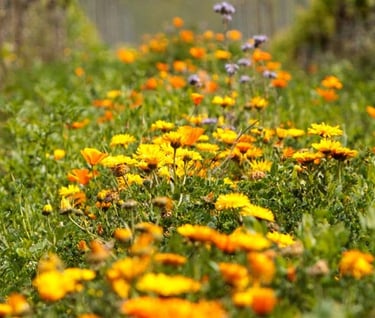
Top 5 Sustainable Wineries You Should Invest In Now
2/20/2025


Sustainability has become a central focus in the wine industry, with more wineries adopting organic, biodynamic, and environmentally responsible practices to protect their land and future. These sustainable producers are not only producing exceptional wines but are also gaining traction among eco-conscious consumers and investors. As the demand for sustainable products grows, so too does the value of wines from these forward-thinking wineries.
In this week’s WineLux edition, we highlight five sustainable wineries that are making waves in the fine wine market. These producers are combining excellence in winemaking with a commitment to preserving the environment, making them smart investments for 2025 and beyond.
Why Invest in Sustainable Wineries?
Sustainability is no longer just a buzzword in the wine industry—it’s a movement that is reshaping consumer preferences and influencing market trends. Wineries that embrace sustainable practices are positioned for long-term success, as both consumers and investors increasingly prioritise environmental responsibility. Here’s why investing in sustainable wineries makes sense:
Growing Consumer Demand: Modern consumers, particularly younger generations, are increasingly seeking out wines that reflect their values. Wineries with strong sustainability credentials are often able to command higher prices and foster brand loyalty.
Long-Term Viability: Sustainable viticulture practices, such as organic and biodynamic farming, help to maintain the health of the vineyards, ensuring high-quality production for years to come. This long-term approach adds intrinsic value to the wine and the estate itself.
Market Resilience: Wineries that focus on sustainability often have more resilient business models, with a loyal customer base and an ability to adapt to changing environmental conditions.
Top 5 Sustainable Wineries to Watch
1. Château Pontet-Canet (Bordeaux, France)
Château Pontet-Canet is one of Bordeaux’s leading biodynamic producers, setting an example for sustainability in one of the world’s most prestigious wine regions. Located in Pauillac, this Fifth Growth estate transitioned to biodynamic practices in 2005 and has since produced some of the region’s finest wines, with a focus on environmental responsibility. The estate uses horses to plough the vineyards and limits the use of chemicals, all while maintaining exceptional quality.
Why Invest: Château Pontet-Canet’s commitment to sustainability has elevated its reputation, and its wines are highly sought after by both collectors and investors. The combination of biodynamic farming and the estate’s top-tier terroir make these wines a strong long-term investment.
2. Domaine Zind-Humbrecht (Alsace, France)
Alsace is renowned for its expressive white wines, and Domaine Zind-Humbrecht is one of the region’s most iconic biodynamic producers. Olivier Humbrecht, one of the few winemakers in the world with the prestigious title of Master of Wine, has led the estate’s transition to biodynamic viticulture. The result is a range of wines that reflect their terroir with purity and complexity, particularly their Rieslings and Gewürztraminers.
Why Invest: Zind-Humbrecht’s wines are already prized for their precision and aging potential, and their focus on biodynamic farming ensures that they will continue to be leaders in the Alsace region. The estate’s strong reputation and environmentally responsible approach make these wines valuable additions to any portfolio.
3. Ridge Vineyards (California, USA)
Ridge Vineyards, located in California’s Santa Cruz Mountains and Sonoma County, has long been a champion of sustainable winemaking. The estate is known for its commitment to organic farming and minimal intervention winemaking, producing some of California’s most iconic wines, including its flagship Monte Bello Cabernet Sauvignon. Ridge is also a leader in transparent labelling, detailing all ingredients used in the winemaking process.
Why Invest: Ridge’s wines, particularly its Bordeaux-style blends and Zinfandels, have a proven track record of excellence and long-term value. The estate’s commitment to organic farming and transparency resonates with modern consumers, making Ridge a smart investment for those looking to align their portfolio with sustainability.
4. Felton Road (Central Otago, New Zealand)
Felton Road is one of New Zealand’s most celebrated wineries, producing biodynamic wines in the heart of Central Otago. Known for its stunning Pinot Noir, Felton Road has gained international acclaim for its focus on sustainable practices and its commitment to organic and biodynamic farming. The winery’s vineyards are fully certified organic, and it is widely regarded as one of the best producers in the Southern Hemisphere.
Why Invest: Felton Road’s Pinot Noirs are highly collectible, with strong demand from collectors and critics alike. The estate’s commitment to sustainability and quality makes it a standout in the growing New Zealand wine market, and its wines offer significant investment potential.
5. Bodega Catena Zapata (Mendoza, Argentina)
Bodega Catena Zapata is a pioneer in Argentina’s wine industry, leading the charge for sustainability and innovation in Mendoza. Known for producing world-class Malbecs, Catena Zapata has embraced high-altitude viticulture and sustainable farming practices to create wines that are both environmentally responsible and of exceptional quality. The estate is dedicated to protecting biodiversity in its vineyards and has implemented a range of eco-friendly practices to reduce its carbon footprint.
Why Invest: Catena Zapata’s wines, particularly those from its Adrianna Vineyard, have consistently earned top scores from critics. The winery’s focus on sustainability and innovation has made it a leader in South America, and its wines are increasingly sought after by collectors and investors.
The Growing Impact of Sustainable Practices on Wine Prices
Sustainable wines are not just a niche market—they are becoming a driving force in the global wine industry. As more consumers and investors prioritise environmental responsibility, sustainable wines are seeing price increases on the secondary market. Wineries that invest in organic and biodynamic farming practices are often able to charge premium prices, and their wines tend to have better long-term market performance.
In addition, sustainable vineyards are better equipped to deal with the effects of climate change, making them more resilient to environmental challenges. For investors, this means that wineries with strong sustainability credentials are likely to be better positioned for long-term growth and stability.
How to Identify Sustainable Investment Opportunities
When looking to invest in sustainable wineries, consider the following factors:
Certifications: Look for wines that carry certifications such as Organic, Biodynamic, or Fair Trade, which indicate the winery’s commitment to sustainability.
Producer Reputation: Wineries with a long history of excellence and innovation in sustainable practices are more likely to produce wines that hold or increase their value.
Consumer Trends: Monitor global consumer preferences for sustainable and organic products. As demand for these wines continues to rise, so too will their value on the market.
Conclusion: Invest in the Future of Fine Wine
Sustainability is not just a trend—it’s the future of the fine wine market. By investing in wineries that prioritise environmental responsibility, you’re not only making a smart financial decision but also supporting practices that protect the planet for future generations. The wineries highlighted in this edition are leading the way in sustainable winemaking, offering investors both quality and long-term growth potential.

